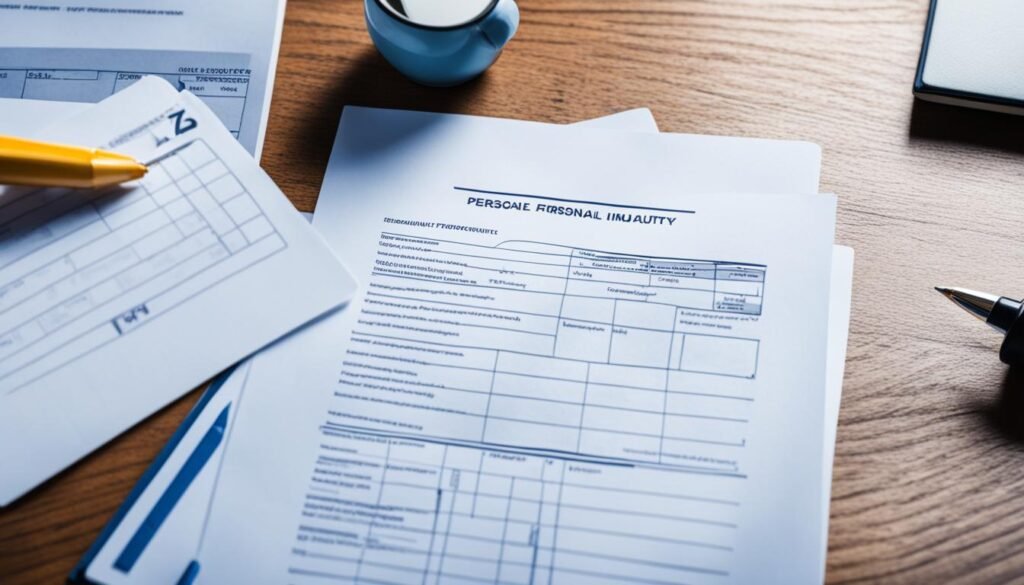Did you know a large number of legal disputes in the U.S. are about personal injuries? In a single year, there were over 400,000 claims. This shows how common these cases are. It also shows why it’s important for people to know about personal injury settlements.
Personal injury cases can bring up many questions, especially about settlements. Knowing how these settlements work is key. It helps you navigate negotiations and get the most compensation. We’ll cover some common questions about personal injury settlements. This gives you the info needed to understand the process better.
Key Takeaways:
- Personal injury cases are prevalent, with over 400,000 claims filed in a single year.
- Gaining a comprehensive understanding of personal injury settlements is crucial for maximizing compensation.
- In this section, we will address common personal injury settlement FAQs
How Does a Personal Injury Case Begin?
To start a personal injury case, you must file a summons and complaint in court. This is how you begin your legal battle against the person who hurt you. You need to include crucial details about your injury and what you want in return. Following the court’s rules from the start is key.
Starting your case with a summons and complaint is vital to get compensation. This step officially starts legal action against the one who caused your injury.
The summons tells the defendant they are being sued and gives a deadline to reply. The complaint shares your injury details, who is to blame, and what you want for it. It’s important to make sure your complaint is detailed and accurate.
“The summons and complaint are the foundation of your personal injury case. They begin the legal journey. Make sure these documents are well-prepared and filed right.”
After filing, the court lets the defendant know about the lawsuit and that they must respond. The defendant has a set time to answer or take other legal steps.
Why is Filing a Case with a Summons and Complaint Important?
Filing your case starts the legal process for your injury claim. It makes an official record that you want compensation. This process makes sure your case is heard in court and that the other party answers for what they did.
The way to file a case can change based on where you are and the laws there. It’s smart to talk to a skilled personal injury lawyer. They can help you file everything right and follow the process.

What Should You Do After Sustaining Injuries?
After you get hurt, there are key steps to take to protect your rights and get a good outcome. It’s important to act quickly and follow these steps carefully:
1. Seek Immediate Medical Attention
If you’re hurt, see a doctor right away, even if you feel ok. Some injuries might not show up right away. A doctor can figure out what’s wrong and write down your injuries. Make sure to follow your doctor’s advice and go to all your extra appointments. This helps you heal properly.
2. Gather Evidence
To make a strong case, you need evidence. Take pictures of your injuries right after you get hurt. Make sure the photos show how bad your injuries are. Also, write down everything about the accident, like when and where it happened. If there were people who saw it, get their contact info. Their stories can make your case stronger.
3. Follow Attorney Instructions
Talk to a lawyer who knows about personal injury as soon as you can. They’ll explain the legal steps and give advice just for your case. It’s important to do what they say so you can protect your rights and get the most money possible.
Doing these things right away helps a lot with winning your personal injury case. By seeing a doctor, finding evidence, and listening to your lawyer, you can make a solid case. Then, you can get the money you need.

What Factors Affect Personal Injury Settlement Amounts?
Several factors can change the final amount you get from a personal injury settlement. Knowing these factors helps in talks and guessing your settlement’s worth.
Economic Damages: Economic damages are the money losses from your injury. This includes medical bills, lost income, and other costs. More economic damages mean a likely higher settlement.
Pain and Suffering: Personal injury settlements also look at non-economic damages, like pain and suffering. This covers the physical and emotional stress from your injury. Though harder to measure, pain and suffering matter a lot in determining your settlement.
Severity of Injuries: How bad your injuries are affects the settlement. Worse injuries lead to higher settlements because they need more medical care and affect your life more. The impact of your injuries is considered in the settlement value.
Defendant’s Resources: You also have to think about how much the defendant can pay. If they don’t have much money, it could limit your settlement. Your lawyer will look into the defendant’s finances to try for a fair settlement.
Knowing these factors helps you fight for what you deserve in a personal injury case. A skilled personal injury lawyer will make sure these factors are used in talks to get you the best settlement.
Navigating the Personal Injury Settlement Process
The personal injury settlement process can seem tough and long. But, with the right help, you can get through it. How long it takes to settle varies. It depends on your case details and if everyone agrees. Some cases settle fast with talks, while others go to trial.
Settlement negotiations are key in this journey. This is when your lawyer really matters. They fight for fair compensation for you. They talk with the other side or their insurance to agree on a settlement.
If talks don’t work or the offer isn’t fair, you might go to trial. At the trial, your lawyer shows your side to a judge and jury. They use evidence and arguments to back your claim. Trials take longer and are unsure, but sometimes they’re needed for fair compensation.
Throughout this process, your lawyer plays a vital role. They guide you, protect your rights, and aim for the best compensation. They handle talks and get your case ready for trial. They stand by you as your supporter and advisor.

